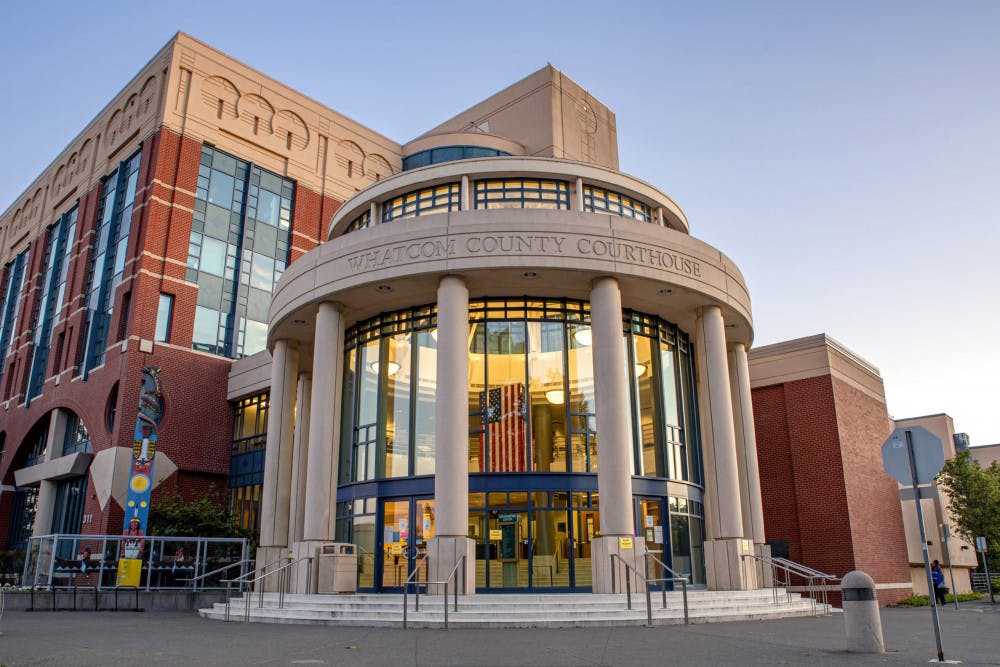Three candidates running for Whatcom County judge face each other in an open forum.

Whatcom County Superior Court judge position 2 candidates James Erb, Evan Jones and Lisa Keeler answered questions from the community in an open forum July 13.
Indivisible Bellingham, a network of independent grassroots groups, hosted the forum.
The county has four superior court judge positions, and each judge must serve for no less than two years.
Debora E. Garrett is the incumbent position 2 judge.
Superior court judges preside over adult felonies, civil cases, divorce, child custody and child support hearings, probate, guardianships, paternity actions, adoptions, juvenile cases and crimes related to mental illness, according to the Whatcom County website.
Kevin Leja, Indivisible Bellingham co-founder and co-leader, began the forum by asking the candidates how they would improve Whatcom County’s justice system.
“What strikes me as something the court will be involved in is these discussions about racial inequities with people in the courtroom,” said Evan Jones, one of the candidates.
All candidates spoke about implicit bias, and their intent to battle their own biases while practicing law.
According to the Stanford Encyclopedia of Philosophy, implicit bias suggests that people can act on the basis of prejudice and stereotypes without being fully aware of it.
Erb noted that the new judge would serve on the county’s Incarceration Prevention and Reduction Task Force to help improve the community.
Erb also emphasized the importance of mental health court, which implements mental health treatment over incarceration. He proposed increasing its use to reduce the number of people who are incarcerated.
Leja asked the three candidates how they would address calls to defund law enforcement and address systemic racism.
Keeler noted she intends to identify and dismantle racism from within the legal system if elected Superior Court judge. She discussed her experiences growing up in Los Angeles during the 1992 riots.
“That was not the only circumstance of reaction to racism, but specifically those reaction to court cases,” Keeler said. “I have seen it. I think it is really important to constantly be challenging ourselves as judicial officers to say ‘What are my implicit biases?’”
Keeler also defined public accountability: “Being open as a judicial officer to someone looking at your work, which is not an easy thing to do, but saying ‘Come tell me if I am doing something wrong’ and keep being educated,” Keller said.
Erb noted the recent examples of racial injustice that fill the criminal justice system. He said he wants everyone who works in the justice system to take ownership, and do better by including people of color and letting them lead.
Jones spoke on the issues he had seen as a prosecutor and the inequities that occur when creating a jury.
“Racial inequity in the criminal justice system and otherwise is a problem,” Jones said.
He said he stands in solidarity with those who experience injustice.
Leja brought up the topic of inequality in the courtroom.
“We’ve seen numerous examples of police and prosecutors acting in bad faith when prosecuting defendants,” Leja said. “It’s in cop shows, and it’s in real life too.”
Leja then asked candidates what they would do to protect citizens from injustice.
“I will assume the position with fairness in mind, an open mind and will work hard to make sure the rights for all people are always respected, so that justice can be done,” Erb said.
All candidates spoke about their intent to conduct business with fairness and an open mind.
“Accountability is key,” said Keeler. “Holding those accountable as appropriate under the law for violating the Constitution, for violating statutes, for not following the rules and procedures.”
Leja brought up overcrowding at Whatcom County jail.
Jones said he was involved in the process for creating safe jail protocols during the COVID-19 pandemic as part of a collaboration of justice officials.
Keeler and Erb agreed that it took the COVID-19 pandemic to reassess protocols and for law officials to take action with new systems.
On the topic of bail and bonds, all candidates recognized the inequity of the system.
“There is an inherent disparity with bail and bonds,” said Keeler. “If your freedom is based solely on whether you are a ‘have’ or a ‘have not,’ we have an inherent disparity.”
Erb added that if the Whatcom County justice system were to eliminate bail, there would need to be a case-by-case analysis in order to protect the community from potential danger.
All candidates recognized Whatcom County’s pretrial release, which is a set of less restrictive conditions that assures return to court as an alternative to bail.
“We believe putting poor people with problems in jail does really nothing to help the people, or the problem,” said Leja.
All candidates agreed that more programs can be implemented to avoid incarcerating people with mental health or substance abuse issues.
Voting for the Whatcom County Superior Court judge will take place Nov. 3 in the general election.
Next Monday, July 20, Indivisible Bellingham will hold a forum for Whatcom County Superior Court judge position 4.





